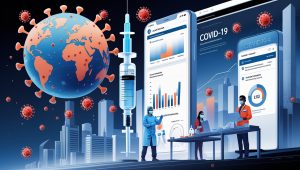
As the world continues to navigate the challenges posed by COVID-19, staying informed about the latest updates is crucial. Governments, healthcare professionals, and communities are working tirelessly to manage the pandemic’s impact. This article provides an overview of the most recent developments in the fight against COVID-19, including vaccination progress, emerging variants, and public health measures.
Vaccination Progress
Vaccination remains the cornerstone of global efforts to combat COVID-19. As of now, billions of doses have been administered worldwide, significantly reducing hospitalizations and deaths. Many countries have achieved high vaccination rates, leading to a sense of normalcy returning in some regions. Booster shots are also being rolled out to strengthen immunity, particularly against emerging variants.
Notably, vaccine development has expanded to include updated formulations targeting specific variants such as Omicron. These next-generation vaccines aim to provide broader and more robust protection. Efforts are also underway to increase vaccine accessibility in low-income countries, addressing disparities in global vaccination coverage.
Emerging Variants
The virus continues to evolve, with new variants being closely monitored by scientists and public health officials. Some variants, such as Omicron and its sublineages, have demonstrated increased transmissibility. While vaccines and natural immunity have offered substantial protection, these variants pose challenges in terms of breakthrough infections.
Recent studies suggest that existing vaccines remain effective in preventing severe illness and death, even against newer variants. However, ongoing surveillance and research are critical to understanding the full implications of these mutations. Governments worldwide are reinforcing genomic sequencing efforts to detect and respond to variants promptly.
Public Health Measures
Public health measures have evolved alongside the pandemic. While many countries have lifted strict lockdowns and mask mandates, others continue to enforce specific guidelines based on infection rates and healthcare capacity. Personal responsibility has become a key aspect of managing the virus, with individuals encouraged to follow basic hygiene practices, wear masks in crowded spaces, and stay home when unwell.
Testing and contact tracing remain essential tools in controlling outbreaks. Rapid antigen tests have become widely available, allowing individuals to monitor their health conveniently. In addition, digital tools and apps have enhanced contact tracing efforts, making it easier to identify and isolate cases.
Travel and Global Impacts
International travel has resumed in many parts of the world, albeit with varying restrictions. Travelers are often required to provide proof of vaccination, negative test results, or recovery from COVID-19. These measures aim to balance economic recovery with public health safety.
The pandemic’s economic and social impacts continue to be felt globally. Industries such as hospitality, tourism, and retail are recovering, but challenges like inflation, supply chain disruptions, and workforce shortages persist. Governments are implementing stimulus packages and support programs to mitigate these effects.
Looking Ahead
The fight against COVID-19 is far from over, but significant progress has been made. Vaccines have saved millions of lives, and public health systems have adapted to better manage the virus. The focus now shifts to living with COVID-19 as an endemic disease, requiring long-term strategies and global cooperation.
Hi, this is a comment.
To get started with moderating, editing, and deleting comments, please visit the Comments screen in the dashboard.
Commenter avatars come from Gravatar.